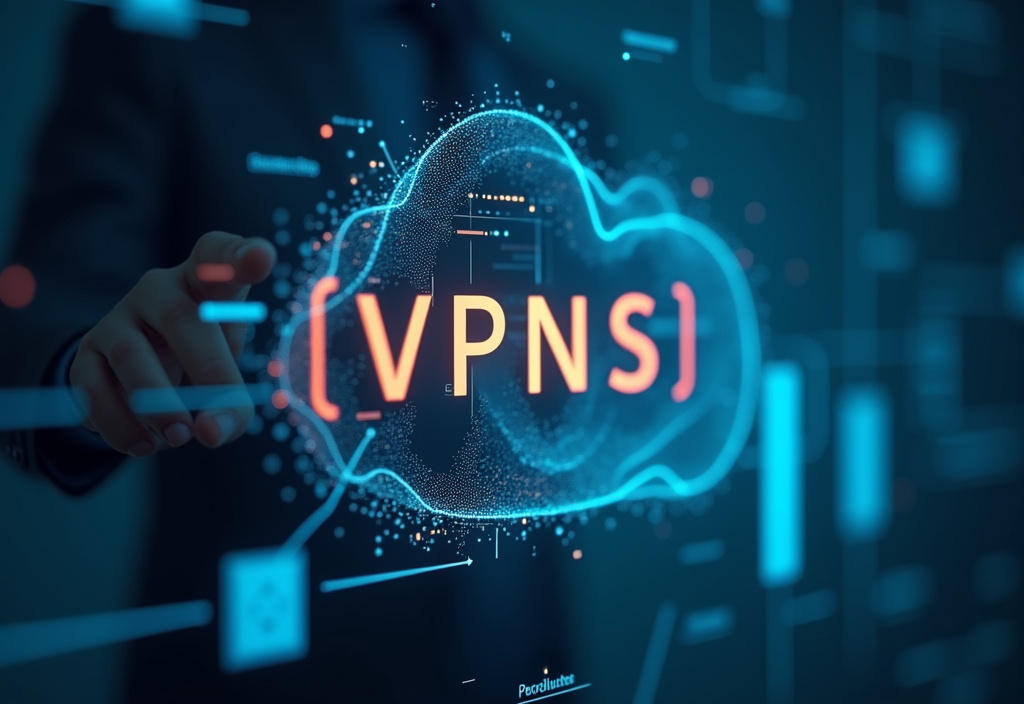VPNs for Financial Advisors: Securing Client Portfolios

Table of Contents
- Introduction: The Critical Need for Cybersecurity in Financial Advisory
- Understanding VPNs: A Financial Advisor's Shield Against Cyber Threats
- Implementing VPNs: Practical Steps for Financial Advisory Firms
- VPN for Services: Enhancing Security and Privacy for Subscription-Based Financial Platforms
- The Future of VPNs: Evolving Security Solutions for Financial Professionals
Introduction: The Critical Need for Cybersecurity in Financial Advisory
In the intricate world of finance, where client portfolios represent years of hard work and future aspirations, safeguarding sensitive financial data is not merely a best practice; it's a fiduciary responsibility of paramount importance. Financial advisors, entrusted with managing these assets, navigate a digital landscape fraught with ever-evolving cyber threats targeting confidential client information and financial transactions. The rise of remote work, cloud-based platforms, and reliance on public Wi-Fi networks have only exacerbated these vulnerabilities, making robust cybersecurity more crucial than ever.
Failing to adequately protect client portfolios carries severe consequences, including financial losses, reputational damage, regulatory penalties, and erosion of client trust, jeopardizing the very foundation of the advisor-client relationship. Understanding the threats, adopting proactive security measures, and embracing advanced technologies are crucial steps for financial advisors to fortify their digital defenses. One technology, in particular, stands out as an essential component of a comprehensive cybersecurity strategy: the Virtual Private Network (VPN).
A VPN acts as a digital shield, creating a secure, encrypted tunnel for data transmission between a device and a remote server, effectively concealing online activity and protecting sensitive information from prying eyes. This is especially critical for financial advisors who routinely access and transmit highly confidential data from diverse locations, including client meetings, home offices, while on travel, as these are places where using non secure and non private networks increase the risk of sensitive information being accessed by third parties. In essence, it becomes an indispensable tool for mitigating risks and fulfilling their duty to protect their clients' financial well-being.
The primary function of a financial advisor VPN is to encrypt all data transmitted over the internet. Encryption scrambles data into an unreadable format, rendering it incomprehensible to unauthorized individuals who may intercept it. This is particularly crucial when using public Wi-Fi networks, which are inherently insecure and susceptible to eavesdropping.
A VPN encrypts all data transmitted, including usernames, passwords, account numbers, and transaction details, preventing hackers from gaining access to sensitive information. In addition to encryption, VPNs offer another layer of security by masking your IP address, which is a unique identifier that can be used to track your location and online activity. By routing your internet traffic through a remote server, a VPN effectively conceals your real IP address, making it more difficult for hackers to target your device or network.
A financial advisor VPN provides a secure and reliable connection, safeguarding client data and ensuring the integrity of financial transactions. By encrypting data, masking IP addresses, and preventing DNS leaks, a VPN creates a secure digital environment that protects client portfolios from cyber threats. Whether working from a remote office, traveling, or using public Wi-Fi, a VPN is an essential tool for financial advisors who are committed to protecting their clients' financial well-being and maintaining compliance with regulatory requirements.
Choosing the right VPN for your needs is essential for ensuring the protection of sensitive financial data. By implementing strategic cybersecurity measures, including the use of robust VPNs, financial advisors can effectively mitigate risks and ensure the confidentiality, integrity, and availability of client portfolios. This, in turn, fosters trust, strengthens client relationships, and safeguards the long-term success of their practice.
A well configured VPN not only protect the data while transit but also protects the financial advisor from any liability due to negligence in data protection.
Understanding VPNs: A Financial Advisor's Shield Against Cyber Threats
Beyond the basic encryption and IP masking capabilities, financial advisor VPN offers a suite of advanced security features designed to address the specific challenges faced by professionals in the financial industry. One crucial feature is a "kill switch," which acts as an automatic failsafe if the VPN connection unexpectedly drops. In such a scenario, the kill switch immediately terminates the internet connection, preventing any unencrypted data from being transmitted and potentially exposed.
This is particularly critical for financial advisors who are actively engaged in sensitive transactions or accessing confidential client data in real-time. A kill switch ensures that even in the event of a VPN failure, sensitive information remains protected, safeguarding client portfolios from unauthorized access. Furthermore, robust financial advisor VPN implements stringent DNS leak protection measures to prevent Domain Name System (DNS) requests from being routed through the default ISP (Internet Service Provider) servers.
DNS servers translate domain names (like google.com) into IP addresses, and if these requests are not properly secured, they can reveal your browsing activity to your ISP, even when connected to a VPN. Sophisticated VPNs ensure that all DNS requests are routed through their own secure servers, preventing any leakage of browsing information and maintaining user privacy. This is particularly important for financial advisors who frequently access financial websites and online portals containing sensitive client data.
Another critical aspect of financial advisor VPN is the implementation of strong authentication protocols. Multi-factor authentication (MFA), for instance, adds an extra layer of security by requiring users to provide multiple forms of identification before gaining access to the VPN. This could include a password, a security code sent to a mobile device, or biometric authentication.
MFA significantly reduces the risk of unauthorized access, even if a password is compromised. In addition to these technical features, the logging policies of a VPN provider are of paramount importance. A reputable VPN provider should have a strict "no-logs" policy, meaning that they do not collect or store any data about your browsing activity, IP address, connection timestamps, or other sensitive information.
This ensures that your online activities remain private and confidential. It's crucial to carefully review the VPN provider's privacy policy to understand their logging practices before subscribing to their service. Opt for VPN providers that have undergone independent audits to verify their no-logs claims.
The geographic location of the VPN provider is also a factor to consider. VPN providers located in countries with strong data privacy laws are generally more trustworthy than those located in countries with lax regulations or those known for mass surveillance. Furthermore, the server infrastructure of a VPN provider is a critical determinant of its performance and reliability.
A VPN provider with a geographically diverse network of servers can offer faster connection speeds and greater flexibility in terms of server locations. This is particularly important for financial advisors who may need to access financial websites or online portals that are geographically restricted. A reliable server infrastructure ensures a stable and secure connection, regardless of your location.
The effectiveness of the VPN also depends on the user's awareness and best practices. For instance, regularly updating the VPN software, using strong and unique passwords, and avoiding suspicious websites and links are all crucial for maintaining security. Financial advisors should also educate their clients, peers about the potential risks associated with unsecured internet connections and the importance of personal cyber hygiene.
Implementing VPNs: Practical Steps for Financial Advisory Firms
Delving deeper into the practical applications of VPNs for financial advisors reveals a multitude of use cases that directly enhance client portfolio security and data integrity. Consider the scenario of a financial advisor attending a client meeting at a coffee shop or airport, relying on public Wi-Fi to access client account information and discuss investment strategies. Without a VPN, this seemingly innocuous activity exposes sensitive data to potential interception by hackers lurking on the same network.
These hackers can employ various techniques, such as packet sniffing, to capture unencrypted data transmitted over the Wi-Fi network, potentially gaining access to client credentials, account balances, and transaction history. A financial advisor VPN effectively neutralizes this threat by encrypting all data transmitted over the public Wi-Fi network, rendering it unreadable to anyone who might be trying to eavesdrop. Even if a hacker manages to intercept the encrypted data, they would be unable to decipher it without the encryption key, which is only known to the advisor and the VPN server.
This ensures that client information remains confidential and protected, even in unsecured environments. Another common scenario involves financial advisors working remotely from home, often using personal devices to access client data. While working from home offers flexibility and convenience, it also introduces potential security vulnerabilities, particularly if the home network is not properly secured.
Home routers are often configured with default passwords, making them easy targets for hackers. Additionally, home networks may be vulnerable to malware infections, which can compromise the security of all devices connected to the network. A financial advisor VPN provides a secure tunnel for data transmission between the advisor's device and the firm's network, shielding data from potential threats on the home network.
This ensures that even if the home network is compromised, client data remains protected within the encrypted VPN tunnel. Furthermore, a VPN can also be used to secure communications between a financial advisor and their clients. Email, for instance, is a common method of communication, but it is also inherently insecure.
Email messages are often transmitted in plain text, making them vulnerable to interception and reading by unauthorized individuals. A financial advisor VPN can be used to encrypt email messages, ensuring that only the intended recipient can read them. This is particularly important when transmitting sensitive information such as account statements, tax documents, or investment recommendations.
Beyond protecting data in transit, a VPN can also help to prevent phishing attacks, which are a common tactic used by hackers to steal sensitive information. Phishing attacks typically involve sending fraudulent emails or text messages that appear to be from a legitimate source, such as a bank or financial institution. These messages often contain links to fake websites that are designed to steal usernames, passwords, and other sensitive information.
A financial advisor VPN can help to protect against phishing attacks by blocking access to known phishing websites. By preventing access to these websites, a VPN can significantly reduce the risk of falling victim to a phishing scam. Moreover, strict regulations imposed on the financial services industry, such as the SEC's Regulation S-P and GDPR, mandate that firms implement adequate safeguards to protect client data.
A VPN can play a crucial role in meeting these regulatory requirements by providing an additional layer of security for client portfolios and sensitive communications.
VPN for Services: Enhancing Security and Privacy for Subscription-Based Financial Platforms
Moving beyond individual scenarios, financial advisor VPN also plays a crucial role in protecting transaction integrity and preventing fraudulent activities. Financial transactions, by their very nature, involve the exchange of highly sensitive information, such as account numbers, routing numbers, and transaction amounts. These transactions are prime targets for hackers who seek to intercept and manipulate them for financial gain.
A VPN ensures that all financial transactions are encrypted and protected from tampering, safeguarding client assets and preventing fraudulent activities. Consider the scenario of a financial advisor initiating a wire transfer on behalf of a client. Without a VPN, the wire transfer details could be intercepted by a hacker who could then alter the routing number or account number, diverting the funds to their own account.
A financial advisor VPN encrypts the wire transfer details, making it virtually impossible for a hacker to tamper with the transaction without being detected. This ensures that the funds are transferred to the correct recipient and that the client's assets are protected. In addition to wire transfers, VPNs can also protect other types of financial transactions, such as online trades, fund transfers, and bill payments.
Any financial transaction that involves the transmission of sensitive information can benefit from the added security provided by a VPN. Furthermore, a VPN can also help to prevent man-in-the-middle attacks, which are a type of cyberattack where a hacker intercepts communications between two parties, such as a financial advisor and their client, and then impersonates one of the parties to steal information or manipulate transactions. A VPN encrypts all communications between the advisor and the client, making it much more difficult for a hacker to intercept and impersonate either party.
By preventing man-in-the-middle attacks, a VPN helps to ensure the integrity and authenticity of all communications and transactions. The benefits of using a VPN for transaction protection extend beyond simply preventing fraudulent activities. A VPN can also help to improve the overall security posture of a financial advisory firm, making it less vulnerable to cyberattacks.
By implementing a VPN, a firm can demonstrate to its clients and regulators that it is taking proactive steps to protect client data and ensure the integrity of financial transactions. This can help to build trust and confidence in the firm, attracting new clients and retaining existing ones. Moreover, a VPN can also help to comply with regulatory requirements related to data security and privacy.
Many regulations, such as the SEC's Regulation S-P and GDPR, require firms to implement adequate safeguards to protect client data. A VPN can be a valuable tool in meeting these requirements by providing an additional layer of security for financial transactions and sensitive communications. Therefore, integrating a reliable VPN solution into the daily workflow is an increasingly important step towards data protection; this is best done with a proper vpn for finance, where additional tools are put to the service of the user in order to create this safe connection.
The process of encrypting the transactions may seem complicated but in fact the better the financial advisor VPN solution is, the more transparent the process is for the user.
The Future of VPNs: Evolving Security Solutions for Financial Professionals
In conclusion, the evolving landscape of cybersecurity threats demands that financial advisors prioritize the security and confidentiality of client portfolios. The adoption of a reliable financial advisor VPN is no longer a luxury but a fundamental necessity for safeguarding sensitive data, ensuring transaction integrity, and maintaining client trust. By creating a secure, encrypted tunnel for data transmission, a VPN effectively shields client information from prying eyes, prevents man-in-the-middle attacks, and protects against phishing scams.
The benefits of using a VPN in the financial sector are far-reaching, extending beyond simply preventing fraudulent activities. A VPN enhances data integrity, ensuring that financial transactions remain unaltered during transmission. It provides a robust layer of authentication, preventing unauthorized access to sensitive data.
Furthermore, it helps financial advisors comply with stringent regulatory requirements related to data security and privacy, such as the SEC's Regulation S-P and GDPR. Choosing the right financial advisor VPN requires careful consideration of several factors, including encryption strength, server locations, logging policies, kill switch functionality, DNS leak protection, and ease of use. It is crucial to select a VPN provider that offers robust security features, prioritizes user privacy, and has a proven track record of reliability.
In addition to selecting the appropriate VPN, financial advisors should adopt a holistic approach to cybersecurity, incorporating other security best practices such as using strong passwords, enabling multi-factor authentication, regularly updating software, and educating clients about potential risks. Implementing a comprehensive cybersecurity strategy, including the use of a VPN, is not merely about protecting data; it is about building trust and confidence with clients. Clients entrust their financial futures to their advisors, and they expect their advisors to take every precaution to safeguard their assets.
By demonstrating a commitment to cybersecurity, financial advisors can strengthen their client relationships, attract new clients, and enhance their reputation in the industry. The investment in a robust financial advisor VPN and a comprehensive cybersecurity strategy is an investment in the long-term success of the practice. In an era where data breaches are becoming increasingly common, financial advisors who prioritize cybersecurity will be best positioned to thrive and maintain their clients' trust.
As cyber threats continue to evolve, financial advisors must remain vigilant and adapt their security measures accordingly. Staying informed about the latest threats and vulnerabilities, regularly reviewing security policies and procedures, and investing in ongoing cybersecurity training are all essential steps for maintaining a strong security posture. The financial services industry is a prime target for cybercriminals, and financial advisors must recognize the importance of protecting client portfolios.
By embracing a proactive approach to cybersecurity, including the use of a reliable financial advisor VPN, financial advisors can mitigate risks, ensure data integrity, and safeguard their clients' financial futures. From this perspective, VPN is not a piece of software but a mindset, a way of working, to protect all the users involved around one financial advisor.
Stay Updated
Get the latest VPN news, tips, and exclusive deals to your inbox.




